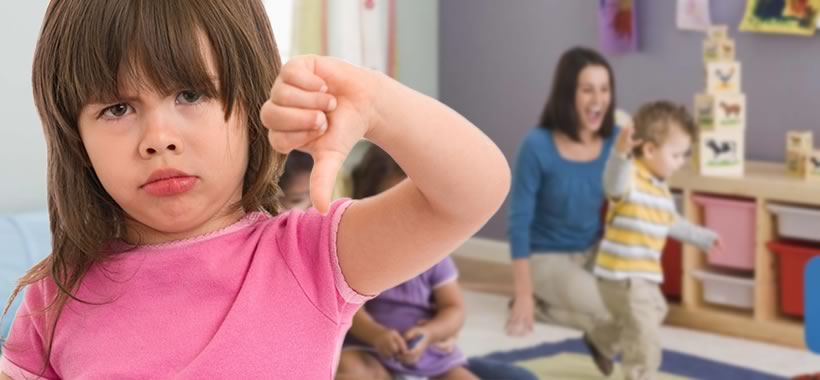If the child is older than six years and his speech flow is interrupted remarkably often, experts speak of stuttering. How children and parents learn to deal with the language disorder

Listening and motivating: this can help a child with a speech disorder
Marco was almost four years old when he started to stutter. "Suddenly he repeated the first syllable of words", recalls Vivienne L. from Taufkirchen near Munich, the boy’s mother. At first, she says, she and her husband Matteo S. would not have noticed that as stuttering, many children of that age spoke that way. Marco, his two older sisters and friends in kindergarten did not particularly notice the language difficulties.
Only when more and more adults broached the subject matter of speaking did the boy realize that something was wrong with him. From that point on, something new came to stutter: "Whenever Marco spoke, he danced from one leg to the other." As if he had to go to the toilet. The prancing was the boy’s attempt to fight against the needless speech – a typical reaction.
The stuttering often goes away on its own
Stuttering means losing control. "The child knows what he wants to say, but cannot because his speaking tool does not receive the command to speak", explains Georg Thum, academic speech therapist in Munich. Then there may be involuntary repetitions of sounds and syllables ("and and and", "Ka-ka-cat"), Strains of sounds ("Mmmmmaus") or blockages (the sound cannot be heard, even though the mouth is, for example, for a "a" opens).
About five percent of all children between the ages of two and six stutter, boys significantly more often than girls. "In 80 to 85 percent of those affected, stuttering goes away on its own", says Thum. Everyone else has the language disorder for a lifetime because it is not curable. Experts cannot predict how the language disorder will develop. However, therapies help to make speaking more fluent. "The goal is also always to strengthen the child so that it can handle stuttering with confidence."
How parents can help
Because stuttering is often accompanied by symptoms that are a reaction to the loss of control when speaking. "This accompanying symptom makes stuttering noticeable for the other person", says graduate speech therapist Dr. Patricia Sandrieser, stuttering expert from the Catholic Clinic Koblenz-Montabaur. And these symptoms lead to stigmatization of the child, who can become an outsider. Vivienne L. also immediately had pictures of stuttering people from her childhood when she noticed that Marco was fighting against the needless speech. "The poor!", it shot through her head, and: "How can we help him??" For example, to get Marco to articulate fluently, she kept asking her son to speak slowly or to concentrate better when speaking. "That was completely wrong, I know that today", says the mother.
The L. family found out what Marco needed instead at the stuttering advice center at the Ludwig Maximilians University in Munich, to which she turned. "Unlike many disorders, there is little basic information about stuttering in our society", says Patricia Sandrieser. It is always circulating many more Myths. For example, many parents wonder whether they have done something wrong and why their child is stuttering. "You can clearly answer this question with a ‘no’", says Georg Thum, who also advised Marco’s parents. Rather, studies in stuttering adults provide reasonable evidence that brain dysfunction can be the cause.
Parents should not ignore stuttering
Experts also know that the predisposition to the language disorder is inherited: someone in the family stutters, is this Risk for a child increased significantly. However, psychological reasons are irrelevant. "Concerned parents, for example, find that their child begins to stutter shortly after the birth of the sibling or after moving, and see a connection in this", says Thum. These are coincidences: "A drastic experience such as moving can be the trigger, but it does not cause stuttering. This means that it would have occurred later without moving."
Another myth that the two experts come across again and again in their consultations: Parents think that stuttering can take care of itself if you don’t speak to the child. A fatal conclusion. "A child notices very early what is wrong with him. If parents ignore this, stuttering becomes a taboo with an uncanny dimension", explains Georg Thum.
Better: address it in an open, relaxed and neutral manner, emphasize the content of what has been said and not the form. "I say: "Man, you told me a great story, sometimes the words didn’t come out," that takes away the suffering. I signal sympathy and give an important message: "I noticed your stuttering, you’re still fine!"", says Patricia Sandrieser.
Give time and listen when speaking
The most important tip of the two experts is therefore: treat a stuttering child like a non-stuttering child! It is just as resilient and does not have to be saved from communication situations. "It just takes more time to speak and that the other person listens to him actively and at eye level", explains Georg Thum. This strengthens the child, because he realizes that he can do something. With this self-confidence, it can also bounce off possible teasing better. What also helps him to do this: repeatedly emphasize that everyone is different, some children wear glasses, others stutter.
Since psychological pressure increases the needless to speak, parents should also sensitize the environment of their child – for example the grandparents, kindergarten teachers or teachers at school. "We experience that the problem is never other children", tells Vivienne L. It’s rather adults who react impatiently. So far, however, the family’s experiences in schools have been almost entirely positive. Marco’s teachers often didn’t even notice the stuttering until they were made aware of it.
Ask the pediatrician for advice
Like many people affected, Marco usually does not suffer from his stuttering. There are phases when the language disorder is barely noticeable to others. Then there are times when he stutters more extreme. In several therapies, he has learned techniques that make his speech more fluent. "The first therapy was very important for us parents, because here we learned how we best deal with Marco", says Vivienne L.
In general, the earlier a child starts therapy, the more successfully it learns the techniques. If you are unsure whether your offspring really needs treatment, it is best to contact the pediatrician first and then look for a therapist who is experienced in stuttering therapy. He should inform about the different therapeutic approaches and then let the family choose which approach to use. "A therapist who promises healing is dubious", says Sandrieser.
Marco now goes to high school. The language disorder no longer scares anyone in the family. "We are joking about it now. For example, I tell Marco that it’s good that he stutters. Because he speaks so much, the other person just needs the breaks to catch his breath", tells Vivienne L.
Patricia Sandrieser observed that always more Families affected can handle the disorder more easily than before: "A stuttering child goes through life relatively unscathed these days. Stuttering does not mean the end of a happy life!"
Speech development disorders in infancy
When the little ones stumble over letters or repeat words, stuttering doesn’t have to develop. This phase is development-related. Children between three and six years old can sometimes stop speaking.
Experts call stagnant speech a developmental deficiency. The children then often take breaks to speak, repeat words or rewrite them. Experts speak of stuttering when the children are older than six years and the flow of speech is interrupted remarkably often.
RELATED ITEMS
-

Migrate in children: what helps against it – baby and family
Children also suffer from migraine attacks: stress can trigger headaches. How parents can help their little ones This video explains…
-

Language training: when is therapy necessary? Baby and family
Lispel, stuttering, selective mutism – more and more children have speech disorders and receive speech therapy. The Munich explains the background…
-

What if the child doesn’t want to go to daycare? Baby and family
Yesterday the child happily went to crèche or kindergarten, today there is protest and roar. What is behind it? Today: thumbs down for that…
-

Children’s birthday: celebrate without stress! Baby and family
Where to celebrate Invite someone? Which games? What’s for dinner? Many parents panic at the thought of children’s birthday. With our tips…
